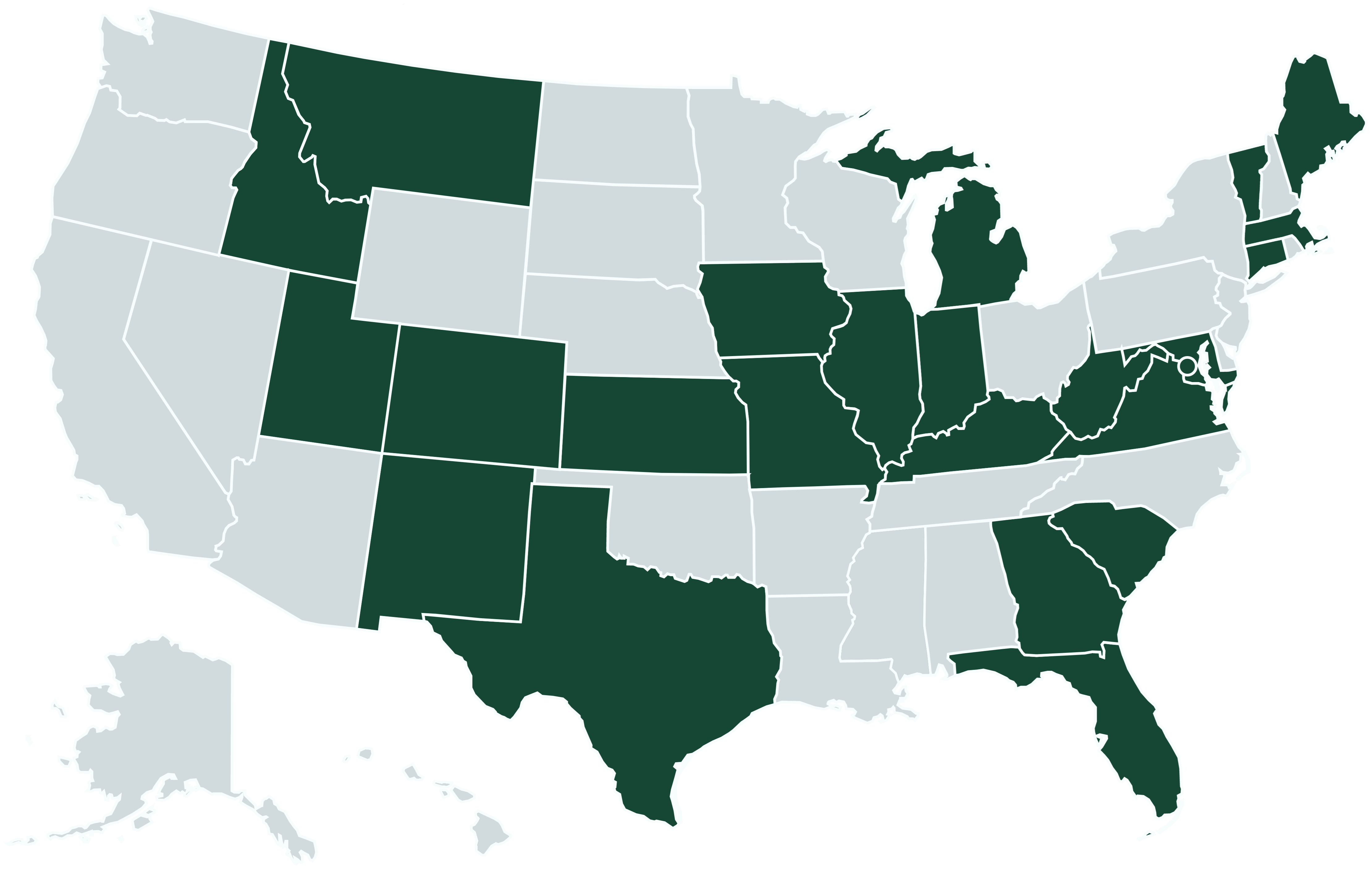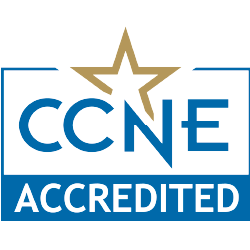- Online Coursework
- Placement Support
- CCNE Accredited
Lead Nursing Care for Infants
The Doctor of Nursing Practice - Neonatal Nurse Practitioner track (DNP-NNP) prepares actively practicing RNs to lead nursing care for infants through the first two years of life.

Make a Meaningful Impact
Baylor's DNP-NNP online program will equip you to become an expert in neonatal care. As a neonatal nurse practitioner with the highest degree in nursing practice, you will have the opportunity to lead change and deliver compassionate care to healthy neonates and high-risk newborns.
Online DNP-NNP students gain specialized knowledge and skills in diagnosing and treating complex medical conditions for newborns up to 24 months old. You’ll learn how to provide essential care for premature and critically ill newborns, manage high-tech equipment and collaborate with other healthcare providers to ensure positive patient outcomes.
-
The requirements to apply for the online BSN-DNP NNP program are:
- BSN from a regionally accredited school of nursing
- 3.0 cumulative GPA
- Courses taken pass/fail will not be eligible for admission
- The equivalent of a minimum (1) year of full-time Level 3 NICU neonatal clinical practice experience (by the first day of class). Experience MUST be current and required within the last five years as a registered nurse in the care of critically ill neonates or infants in critical care inpatient settings.
- Current unencumbered RN license
- Complete an acceptable written personal statement
- Three letters of recommendation, as follows: one must be from an immediate supervisor, one must be from a peer nurse, and one must be from an MSN, DNP, or PhD-prepared nurse
- No GRE or MAT Required
The requirements to apply for the online Post Master's DNP program are:
- Verification of an unencumbered license to practice as an APRN
- Master's degree with a major in nursing
- Cumulative graduate GPA of 3.0 or higher
- Three letters of recommendation as follows: One must be from an immediate supervisor, one must be from a peer nurse and one must be from an MSN, DNP, or PhD-prepared nurse
- Verification of total clinical hours obtained for the Master's degree
- Complete a written personal statement
- Current clinical practice within the last two years
- Successful completion of graduate-level statistics course with a grade of B or better (must be completed prior to matriculation into the program)
-
-
The requirements to apply for the online BSN-DNP NNP program are:
- BSN from a regionally accredited school of nursing
- 3.0 cumulative GPA
- Courses taken pass/fail will not be eligible for admission
- The equivalent of a minimum (1) year of full-time Level 3 NICU neonatal clinical practice experience (by the first day of class). Experience MUST be current and required within the last five years as a registered nurse in the care of critically ill neonates or infants in critical care inpatient settings.
- Current unencumbered RN license
- Complete an acceptable written personal statement
- Three letters of recommendation, as follows: one must be from an immediate supervisor, one must be from a peer nurse, and one must be from an MSN, DNP, or PhD-prepared nurse
- No GRE or MAT Required
The requirements to apply for the online Post Master's DNP program are:
- Verification of an unencumbered license to practice as an APRN
- Master's degree with a major in nursing
- Cumulative graduate GPA of 3.0 or higher
- Three letters of recommendation as follows: One must be from an immediate supervisor, one must be from a peer nurse and one must be from an MSN, DNP, or PhD-prepared nurse
- Verification of total clinical hours obtained for the Master's degree
- Complete a written personal statement
- Current clinical practice within the last two years
- Successful completion of graduate-level statistics course with a grade of B or better (must be completed prior to matriculation into the program)
Clinical Placement Support
At Baylor University’s Louise Herrington School of Nursing, we strongly believe in setting our students up for success. That's why we will collaborate with you to identify clinical sites and preceptors for all clinical rotations. Additionally, clinical placement sites may be potential locations for future employment opportunities upon graduation. If you already have a placement site or preceptor in mind, we encourage you to refer them to our placement team to secure. Get your DNP-NNP guide for more information.
01
How Does This Benefit You?
At Baylor, we believe you are only as successful as your training—that’s why we collaborate with our students to identify and secure sites and preceptors for all clinical rotations. Our staff will sort through the logistics of clinical placement so you can focus more on coursework and building competencies as a nurse.
02
How Does the Clinical Placement Process Work?
As a newly enrolled student, you’ll partner with our clinical team to determine unique placement needs. We’ll collaborate with you to identify placement opportunities, including locating and securing a quality site and preceptor during your program. You’ll be responsible for several preparation tasks, including filling out forms, passing a drug screening, background check and proof of recommended vaccinations.
03
What is the Placement Experience Like?
During your placement experience, you’ll have access to faculty and resources to support you on and off-site, including mentorship and guidance for procedures, patient interactions and proficiencies. At the end of your rotation, you and your preceptor will review requirements and complete any surveys. You may receive new details for your next clinical experience if you have multiple rotations.
04
What Can I Expect from My Preceptor?
Your preceptor is your on-site role model and will help you develop as a nurse during your clinical rotation. They will focus on helping you bridge gaps between theory and practice, orientate you to the practice setting, help you plan clinical assignments, provide 1:1 supervision, give daily feedback and complete required paperwork on your behalf.
Do I Qualify?
See below for a list of states in which we accept applicants for the online DNP-NNP program:
- Colorado
- Connecticut
- District of Columbia
- Florida
- Georgia
- Idaho
- Illinois
- Indiana
- Iowa
- Kansas
- Kentucky
- Maine
- Maryland
- Massachusetts
- Michigan
- Missouri
- Montana
- New Mexico
- South Carolina
- Texas
- Utah
- Vermont
- Virginia
- West Virginia
Get More Program Details
The online DNP-NNP track focuses on high-risk neonates and their families through a curriculum that delivers in-depth knowledge of neonatal nursing theory, assessment, research utilization, critical thinking, diagnostic reasoning, patient management, program planning and systems management.
This course is designed to provide the student with a greater depth of understanding of developmental physiology of the fetus and neonate. Principles of growth and development, physiologic maturation of organ systems, birth physiology, and transition to extrauterine life through early infancy will be covered. Adaptation of physiologic stress and alterations from normal will also be addressed.
Theoretical and practical knowledge needed for advanced practice neonatal nurses (APNN) to manage the health care needs of culturally diverse newborns/infants in neonatal intensive care units (NICU). Content focuses on stabilization, management and evaluation of high-risk and critically ill newborns/infants and their families. Responsibilities of the APNN in perinatal-neonatal health care policy and delivery systems management are also emphasized.
This course provides an overview of the care of the NICU graduate: the infant after NICU discharge through two years of life. The course focuses on parent and family transitions, the care of infants post-discharge, growth and development, immunizations, wellness visits, acute care visits, special considerations for those with long-term complications, and consulting services.
Testimonials
Baylor Nursing By The Numbers
Here are some of the most frequently asked questions regarding Baylor University's Online DNP-NNP program
- BSN holders typically complete our DNP program in three (3) years and four (4) months, skipping the Master’s degree program entirely
- MSN holders typically complete our DNP program in 18 to 24 months
Please note that actual length to program completion will vary depending on the student's background and selected track.
The following practitioner degree disciplines may be eligible to transfer to the online DNP programs:
- Psychiatric Nurse Practitioner
- Acute Care Nurse Practitioner
- Adult-Gerontology Nurse Practitioner
- Certified Registered Nurse Anesthetist (CRNA)
- Women’s Health Nurse Practitioner
A Doctor of Nursing Practice is the optimal pathway for registered nurses who are seeking preparation at the highest level of nursing practice. A DNP degree is a terminal degree in the field and represents the most advanced nursing degree available. There is no further opportunity for educational advancement within this profession. Graduates of Baylor’s online DNP program are prepared as exemplary nursing leaders and visionary nurses who can actively shape and improve patient outcomes, policy, processes and the future of nursing.
DNPs earn a higher salary than an MSN (on average) and have more overall options for career goals. Many DNP graduates enter into positions with more responsibility to care for both individual and population health needs as nursing team leads and other expanded roles. The career outlook for DNPs is anticipated to be very strong as the AACN is advocating to require a DNP for all APRN roles. Read more about the difference between MSN and DNP.
A variety of financial aid is available to online students. Find more information on our Tuition & Financial Aid page.
You must have completed your MSN in Neonatal Nurse Practitioner with a cumulative GPA of 3.0 or higher, and Neonatal Nurse Practitioner Board Certification. Additional documents or experience may be required - download your course guide to learn more.
Yes! Baylor University's Louise Herrington School of Nursing understands the needs and challenges of busy RNs. Our online coursework allows you to balance your career with your other commitments.
With a DNP-NNP, you can lead nursing care for infants up to 24 months old while actively shaping patient outcomes, policy, and processes as a nursing leader.
NNPs work primarily in hospitals within a Level I Well Newborn Nursery, Level II Special Care Nursery, Level III Neonatal Intensive Care Unit (NICU), or Level IV Advanced NICU. NNPs may also work in a specialized clinic that provides follow-up care. Read more about the role of a neonatal nurse practitioner.
Online students of Baylor’s Louise Herrington School of Nursing can expect the same level of education quality as a traditional on-campus program. As an online DNP student, you will be supported by a dedicated Student Success Advisor who will work with you from your entrance into the program all the way through graduation. You will also collaborate with a Clinical Placement Coordinator who will help you identify a quality clinical site and preceptor for clinical rotations, enabling you to focus on coursework rather than spending time on logistics of clinical placements.
The online DNP-NNP coursework is available in the virtual learning environment 24 hours a day, which allows you to complete your degree around your work and personal schedule. In addition, you will stay with the same classmates throughout your degree, allowing for impactful connections. Students of the DNP program enjoy building meaningful relationships with accessible faculty.
If you have additional questions regarding the online format, get in touch with an enrollment advisor.
DNP vs. MSN?
The DNP is a terminal degree that prepares nurses for leadership, given the constantly changing demands of the U.S. healthcare system. Currently, steps are being taken to transition the DNP degree as the standard for entry-level advanced practice registered nurses (APRNs). While the profession is not yet there, earning your DNP helps future-proof your career as a qualified nurse leader.
According to AANC, nurses desiring an APRN education with the choice between a doctoral or master's level preparation would find it far more cost-effective to spend additional time towards their DNP and be prepared for future practice.
"Job opportunities are far greater, and it provides you with the knowledge and expertise to have a seat at the board table," according to Angela Renee Stewart, DNP, APRN, ACNP-BC, AOCNP, TTS, Clinical Assistant Professor at Baylor University, Louise Herrington School of Nursing.
Online DNP-Neonatal Nurse Practitioner Program Outcomes
The Online DNP-Neonatal Nurse Practitioner program outcomes are designed to meet the standards of professional organizations such as the American Organization of Nurse Leadership (AONL), American Association of Colleges of Nursing (AACN), etc.
Upon successful completion of the course of study, graduates will be eligible to sit for the NNP certification examination offered by the National Certification Corporation for Obstetric, Gynecologic and Neonatal Nursing Specialties (NCC) and advance their career as autonomous caregivers. The program of study conforms to the educational guidelines for the state of Texas, the National Association of Neonatal Nurses (NANN) and the National Organization of Nurse Practitioner Faculties (NONPF).
Essential I and III: Synthesize scientific evidence and methods to design, direct, and evaluate strategies to promote effective Patient-Centered care.
Essential II: Incorporate leadership skills and interprofessional team-building strategies to improve quality metrics within health care systems, organizations, and diverse practice settings.
Essential I and III: Synthesize scientific evidence and methods to design, direct, and evaluate strategies to promote effective Patient-Centered care.
Essential IV: Employ information systems and technology in the delivery of transformative health care.
Essential V: Advocate for evidence-based health policy to improve local, national, and/ or global patient and health population outcomes.
Essential VI: Utilize effective interprofessional communication and collaborative skills to facilitate improvement in population health.
Essential VII and VIII: Demonstrate advanced levels of clinical judgment and systems thinking in designing, delivering, and evaluating evidence-based care for clinical prevention and population health.
Essential VII and VIII: Demonstrate advanced levels of clinical judgment and systems thinking in designing, delivering, and evaluating evidence-based care for clinical prevention and population health.
**The baccalaureate degree program in nursing and Doctor of Nursing Practice degree program at Baylor University are accredited by the Commission on Collegiate Nursing Education, 655 K Street, NW, Suite 750, Washington, DC 20001, 202-887-6791.
The DNP program of study conforms to the educational guidelines for the state of Texas and the National Task Force Criteria for Nurse Practitioner Programs.
The program of study conforms to the educational guidelines for the state of Texas, the National Association of Neonatal Nurses (NANN) and the National Organization of Nurse Practitioner Faculties (NONPF)
Our Blogs
Are you considering a second career in nursing? If so, you may be wondering about how to get your first…
















